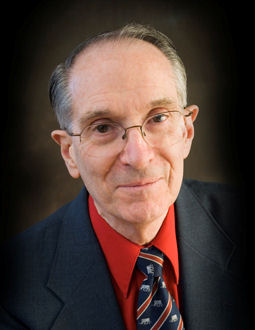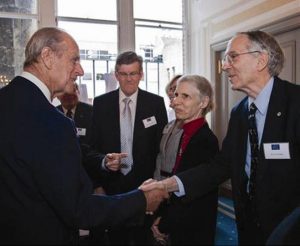 Lew Terman
Lew Terman IEEE SSIT Secretary and long-time Board of Governors Member Lew Terman has been recognized with the prestigious IEEE Emberson Award for 2021.
The citation for the Award reads: “For contributions to and leadership of multiple IEEE Societies, the Technical Activities Board, and the IEEE Humanitarian Technology Activities.”
The IEEE Richard M. Emberson Award was established by the IEEE Board of Directors in 1986. It is presented to an IEEE member for distinguished service to the development, viability, advancement, and pursuit of the technical objectives of the IEEE.
In his education and professional career, Terman received the BS degree in physics, and the MS and PhD degrees in electrical engineering in 1956, 1958 and 1961, respectively, from Stanford University. An online IEEE biography notes that his “PhD thesis was the first work on the measurement of surface states using MOS capacitors. It is one of the most widely used measurements in the industry and resulted in a very widely referenced 1962 paper in Solid State Electronics.” The technique has been called “the Terman Method.”
He worked at IBM’s Research Division for forty-five years where he received six IBM Outstanding Contribution Awards and three IBM Corporate Awards for his technical contributions. He was elected to the IBM Academy of Technology in 1991, and served as President of the Academy in 2001-2003. He has 24 patents and 50 publications in the open literature. He retired as the Associate Director, Systems Department, IBM Research Division in 2006.
Lew’s involvement in IEEE began in 1958, when he joined the predecessor of IEEE, IRE, as a student at the suggestion of his father, Frederick Terman, who had been IRE President in 1941. “One could say that IRE/IEEE was in my genes,” Terman has said.
He was elevated to IEEE Fellow in 1975 “for contributions to the design and development of semiconductor computer memory and logic circuitry.”
Lew’s IEEE involvement, positions, awards and recognitions are legion, and include decades of involvement in the leadership of the IEEE Technical Activities Board (Treasurer 1995-1998, Vice President 2001), and on the IEEE Board of Directors, where he was Division I Director in 2004-2005.
Lew was elected and served as IEEE President in 2008. During his presidency he initiated a major IEEE focus on humanitarian goals. He was a founding contributor to the IEEE Humanitarian Technology Fund, in support of its efforts to apply technology to societal problems. As IEEE President, one of his major focuses was to encourage and enable IEEE members and IEEE as an organization to engage in the application of technologies for humanitarian purposes. To this end, he organized an IEEE Board series plenary, gave talks around the world, and helped create a website, a conference and activities that led to the creation of the Humanitarian Activities Committee. After his presidency, he spent time as Chair of the Humanitarian Ad hoc Committee.
In addition to his enormous contributions to Humanitarian Activities and to the IEEE as a whole, Terman has also been deeply involved in the leadership of several individual IEEE Technical Societies. He was president of the IEEE Electron Devices Society (EDS) in1990-1991, and the IEEE Solid-State Circuits Society (SSCS) in 1998-1999. He received the Solid-State Circuits Technical Field Award and the Electron Devices Society Distinguished Service Award.
Most recently Terman has been active and has served in the leadership of the IEEE Society on Social Implications of Technology (SSIT), where he is currently Secretary. He was honored with the the Brian M. O’Connell SSIT Distinguished Service Award in 2016.
Lew was elected to the TAB Hall of Honor in 2018, and is a Taiwan ITRI Laureate, an IEEE Life Fellow, an AAAS Fellow, and a member of the US National Academy of Engineering.

Above: Lewis (right) and Bobbie (second from right) Terman shake hands with Prince Philip, Duke of Edinburgh (left), at the presentation of the joint award of the Royal Society of Scotland and the IEEE, the James Clerk Maxwell Medal, in 2009.






 JOIN SSIT
JOIN SSIT